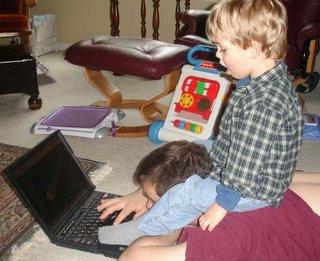
First, I just have to share this picture of Lowell and daddy playing Starfall on the computer. He LOVES it and it really gets him talking:)
After reading Tilt, I find myself wanting to read more books about other parents experiences having a child with autism. I tend to get into these types of reading frenzies during major life changes. When I was pregnant, I loved reading diary-type books about pregnant women. I think it's just one of those ways of reaching out for support. So right now I have on my reading list:
*The Boy Who Loved Windows: Opening the heart and mind of a child threatened with Autism
*The Mind Tree: A miraculous child breaks the silence of Autism
*A Real Boy: A true story of Autism, early intervention and recovery
*Thinking in Pictures: And other reports from my life with Autism
*A Wild Ride up the Cupboards
*Daniel Isn't Talking
*Send in the Idiots: Stories from the other side of Autism
*A Slant of Sun
I find myself looking up information on the authors as well. Seeing if they've really been through it, lived it and are writing from personal experience. They pretty much are. I was thrilled to find that Marti Leimbach, the author of Daniel Isn't Talking, has a blog here as well. In an article she posted online, called A Life Less Ordinary, she addresses many of the same feelings that I'm having and have written about here on my blog (see first post on being "normal"). This really gets right to the heart.
"At night I read accounts of autistic children who had progressed: one child with no language who began to speak; another who could not understand the purpose of a toy and then, after much intervention, learnt to play. I dreamt of one day telling a similar story about Nicholas before an audience of teachers and psychiatrists.
These were the people who told me Nicholas would 'have no useful language', would never attend normal school, and that our efforts to teach him would make no lasting difference. They would all be amazed by his transformation, by how he had shed autism and become a splendidly ordinary little boy.
Of course, this is not the story that transpired. At nine years old Nicholas has made great progress but he will never be normal, and I have learnt that 'normal' should not be the goal. The tools we have given him, hour by hour through an enormous educational effort, have allowed him to express himself - and who he is still includes a great measure of autism.
However, he doesn't 'live in his own world', as autistic children are sometimes said to. He is not silent or withdrawn. Due to early intervention, Nicholas manages his autism so that it is not as great a disability as it could have been.
I can see that within this child lies an intelligence different to my own but no less valid. I can see also that his path in life will be challenging. Am I afraid of what may happen in the future? Yes, but I am comforted by how gentle people are with him, how they forgive his averted gaze, his nervous rocking, his long speeches. It ignites in me a flame of hope, not that he will be 'normal' but that he will be accepted and loved for who he is, however different."
1 comment:
Hi Kari,
I have read both "Thinking in Pictures" and "The Boy Who Loved Windows." They are both wonderful books and very interesting perspectives. I think it is great that you are taking such an active role in the whole process with Lowell.
Shelly
Post a Comment